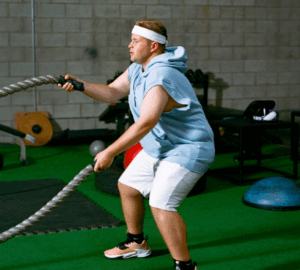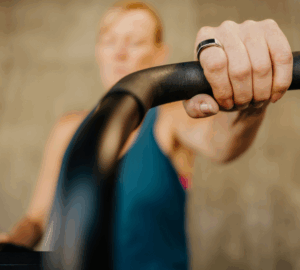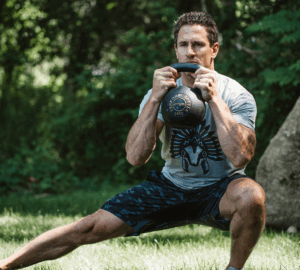- Stress is a normal part of life, but experiencing too much stress – or not appropriately managing your stress – can impact your mental and physical wellbeing.
- Luckily, some science-backed ways to reduce stress are also super simple, including deep breathing, exercise, meditation, and even napping!
- Tag your stress management tools on Oura and monitor how your sleep, RHR, and HRV may change over time.
Everyone feels stressed sometimes. Stress is a natural (and sometimes beneficial!) physiological response that helps you navigate challenges in your environment. But too much stress (acute stress) or consistent stress (chronic stress) can be detrimental to your health and happiness.
According to a 2021 poll, more than 40% of people globally reported feeling worried or stressed. This can take a toll on your health. Chronic stress is linked to psychological and physical issues, ranging from hypertension and metabolic syndrome, to depression and anxiety. Fortunately, it’s something you have some control over.
The good news: These 9 practices and activities can alleviate stress and enhance your resilience to handle stress when it does arise. Even better? They’re all backed by science.
9 Science-Backed Ways to Lower Stress
1. Practice deep breathing.
Use your breath to shift your mind. When you feel weighed down by stress, deep breathing can biochemically release stress and tension. As little as five minutes of deep breathing has been shown to lower stress and boost your mood.
Breathing exercises like diaphragmatic breathing and paced breathing, leverage the connection between respiration and the autonomic nervous system. Through intentional deep breaths, you move out of sympathetic nervous system (SNS) arousal (fight-or-flight mode) and into a parasympathetic (rest-and-digest) state.
Oura member and neuroscientist Kaushik Ram uses vagal breathing as a way to activate rest-and-digest mode. In the Oura App, Ram tracks his heart rate variability (HRV) as a measure of parasympathetic activation. Read his story here.
2. Follow a guided meditation.
Meditation is a practice that involves quietening the mind. The average person has more than 6,000 thoughts each day – no wonder you’re feeling stressed! While you can’t ever “shut off” your mind, meditation aims to get as close to that as possible. There are various meditation styles specifically proven to reduce stress, including mantra meditation, yoga nidra (or non-sleep deep rest), mindfulness, and transcendental meditation.
You can find a range of guided meditations in Explore content on the Oura App. After a session, you’ll receive immediate biofeedback so you can see how your body is responding in real-time.
LEARN MORE: Try Oura’s Guided Sleep Meditations for Deep and Restful Sleep
3. Sweat it out.
When you exercise, your body releases endorphins, neurotransmitters, and other feel-good molecules like brain-derived neurotrophic factor (BDNF). These biochemical mood enhancers combat stress effectively, according to numerous studies. Beyond chemical responses, physical activity offers a constructive outlet for pent-up energy and tension, effectively diverting your attention away from stressors.
Scraping up the motivation to exercise when you’re feeling overwhelmed can be difficult. Good news: a study found that just a six-minute high-intensity workout is enough to produce BDNF.
4. Take a nap.
A bad night’s sleep may not be the sole cause of your stress, but it’s sure going to contribute to it. When you’re sleep-deprived, your SNS is activated. Your levels of cortisol and adrenaline spike, and as a result, so do your stress and anxiety.
Set a timer for a 10 to 30-minute nap – anything longer and you may wake up feeling groggy. If you have trouble napping during the day, try a guided non-sleep deep rest session – you get the benefits of a quick nap while still remaining in a wake state.
READ MORE: How Long Should You Nap?
5. Spend some time in nature.
Research consistently demonstrates the restorative effects of nature on the human psyche. Popular practices like forest bathing, earthing, and ecotherapy can be perceived as unscientific, but there is solid evidence to support their efficacy for reducing stress.
Spending time in nature can lower cortisol levels and rumination (a common feature of anxiety), boost your mood, and activate your rest-and-digest system.
You don’t have to take your shoes off or hug a tree to get the benefits. As little as a 10-minute walk in a natural environment can reduce your stress.
6. Do something fun.
Let your hair down! Even if your to-do list seems never-ending, taking a short break to do something you find enjoyable can help manage stress. When you feel stressed, it can be tempting to listen to sad music and watch depressing movies. But actively trying to shift the tone toward happier stimuli can have a powerful effect on your stress levels and overall mood.
7. Reach out to a loved one.
Stress can leave you feeling like you have the weight of the world on your shoulders. Lighten your load by reaching out to a friend or family member. Whether you choose to share your stressors with them or not, just spending time with a loved one can alleviate stress. In fact, studies have shown that good social support increases your resilience to stress. This happens through various pathways, including the oxytocin pathway, which is your love hormone.
READ MORE: Introducing Oura Circles: Connect with Your Community and Reach Your Goals Together
8. Learn something new.
It may seem counterproductive to add more to your plate, but learning something new helps you develop feelings of competence and self-esteem. This can help you better respond to stressful situations in your life. In psychology, this is referred to as a “growth mindset”. A growth mindset can make you more resilient in the face of stressors, and reframe how you perceive stress.
9. Go for healthier foods.
If you tend to reach for the chips or ice cream when you’re stressed, you’re not alone — 27% of adults admit to stress eating. Food can be a crux for stressed people, particularly food that is high in sugar and fat like pizza and ice cream. Unfortunately, these foods can have the opposite intended effect, and instead exacerbate stress. These foods cause rapid spikes and crashes in your blood sugar, which has a domino effect on other hormones in your body – like cortisol, the stress hormone.
Instead, opt for whole foods that don’t cause sudden insulin spikes. For example, this could be brown rice instead of white rice, or oatmeal for breakfast instead of a sugary cereal. Additionally, it’s a good idea to avoid caffeine and alcohol, which can also trigger your stress hormones.
Manage Stress More Effectively with Oura
Don’t let stress bring you down. The key is to respond to stress before it builds up – this way, it’s easier to manage. No matter which tips you try, aim to be consistent with them for a few weeks so that you can see their impact.
You can tag your stress management tools on Oura using the Tags feature. After a few weeks or months of practicing your new technique, you may start to notice changes in your Oura Scores. For instance, your stress may start to improve, your resting heart rate (RHR) may lower slightly, and your HRV may improve – indicating that your body is learning to handle stress better.
RELATED: HRV and Stress: What HRV Can Tell You About Your Mental Health




